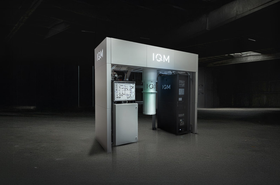The European Energy Efficiency Directive, which aims to reduce energy use and carbon emissions in Europe, has been published. Along with other industrial sectors, it requires action from data center operators in Europe.
The Directive aims to reduce energy use in Europe by 11.7 percent by 2030, to help meet the EU Green Deal goal of a 55 percent cut in carbon emissions by that same date. Data centers are expected to become more efficient, and the first step will be mandatory reporting of energy use and emissions from data centers in the bloc which are larger than 500kW.
“We see an increase of data center energy consumption over time, we've projected this will continue, and we think that it's an important policy objective to try and optimize data centers,” Robert Nuij, deputy Head of Unit for energy efficiency policy and financing at the European Commission told the German Datacenter Conference this week.
Having been passed by the European Parliament, the Directive has now been published in the official journal and comes into force in 20 days. As a Directive, EU member states are required to enact it in their own way within their own laws. Germany will be the first to do this, as part of its Energy Efficiency Act, which is expected to be passed by the German parliament today.
Under the EED, starting on 15 May 2024, data center owners and operators in the bloc will have to report their data center’s energy performance for the previous year annually into a European database.
The data due next year will have to cover the period from May 2023 and will include floor area, installed power, data volumes, energy consumption, PUE, temperature set points, waste heat utilization, water usage, and use of renewable energy. The requirements are set out in Annex VII of the Directive.
There is still some debate about how the data will be reported, acknowledged Nuij: “We are currently working on what we call delegated access or more detailed rules about what exactly one should report and how to measure what should be reported,“ he told the German Datacenter Conference. “We're relying very much on the existing standards in this area, and we're not doing this by ourselves.”
Nuij’s department is taking input from the sector on how reporting should be done.
He noted that the EU is still gathering information, while the Act in Germany has moved on to requiring specific performance measures: “At the European level, we are currently only looking at reporting requirements. We think that we have too little information at the European level to come forward with specific mandatory minimum performance requirements.”
The EU plans to examine the data it gets in 2024, and will come out with a report in 2025, looking at how to ensure performance improves: “Do we need to go to minimum performance requirements? Do we need to do labeling? What could be the best possible steps?”
John Booth of Carbon3it notes that the Directive excludes data centers used for defense, and also begins to make some performance requirements. Data centers larger than 1MW will be “encouraged” to take into account the best practices referred to in the most recent version of the European Code of Conduct on Data Centre Energy Efficiency.




